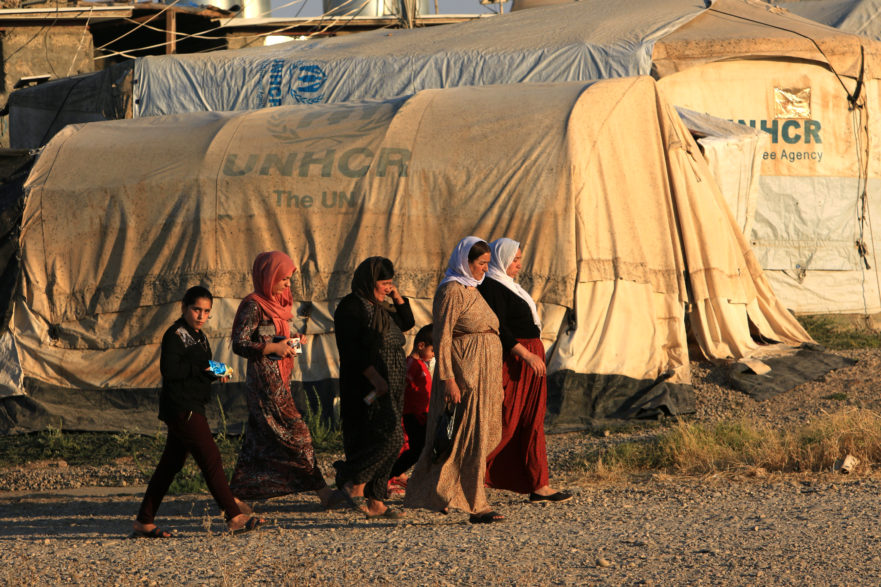Religious and ethnic minorities in Iraq are living at the edge of extinction. They are marginalized and under threat from the genocidal actions of the Islamic State (IS) in Iraq resulting in the purging of religious and ethnic minorities from their historic homes. If immediate action is not taken, the existence of religious and ethnic minority communities such as Christians and Yazidis, will continue on a trajectory of precipitous decline into virtual non-existence in Iraq. This assessment was published in 2015 in a 21Wilberforce report titled “Edge of Extinction” and it rings true today.
Five years ago, ISIS launched a systematic attack against civilians in northern Iraq. Fighters stormed the Nineveh Plains forcing more than 120,000 Christians to flee to Kurdistan. Along with the destruction of the homes and livelihood of thousands of Christians, ISIS attempted to completely destroy any memory of Christianity in Iraq by destroying ancient biblical sites and symbols, including the cross.
Today, estimates of 150,000 to 200,000 Christians remain in Iraq, down from 1.5 million prior to 2003. Approximately 40,000 internally displaced Christians have returned to their ancient homeland in Nineveh, but they routinely encounter discrimination, intimidation, and violence. And Iran backed militias pose a major threat to take their land and property.
Five years ago when ISIS reached Sinjar province, home to the majority of the world’s one million Yazidis, they began a campaign of ethnic cleansing that lasted weeks. Thousands fled the region, many taking shelter in the mountains where they suffered from hunger and thirst. Twelve thousand Yazidis were murdered and 6,800 Yazidis, mostly women and children, were kidnapped and subjected to prolonged physical, sexual and mental abuse. ISIS militants forced Yazidis to convert to their violent and extremist ideology. They sent young boys to re-education camps and then to fight in their war against religious minorities.
Today, more than 400,000 Yazidis are living in displacement and 2,900 Yazidis are still missing. Seventy mass graves have yet to be exhumed and 68 religious and heritage sites were destroyed. “This is not a memory. We are still living this genocide until today, in all its details,” said Yazidi lawmaker Saib Khider. “Our wounds are still open.”
Atrocities committed by ISIS against the Yazidis are now recognized as genocide, crimes against humanity and war crimes by the United Nations, the European Parliament, the Council of Europe, the U.S. House of Representatives and the parliaments of Armenia, Australia, Canada, France, Scotland and the United Kingdom.
Reintegrating persecuted ethnic and religious minority communities into
Iraq is proving to be extremely difficult.
In recent years Iraq has been ravaged by war, an internally displaced persons crisis, sectarianism and a three-year campaign to drive ISIS from a third of the country it controlled. Ejecting ISIS from Mosul was a major achievement for the Shite-dominated government. Iraq’s new constitution, elections for parliament and gradual restoration of civil society are cited as incremental measures toward settling disputes and securing communities.
The U.S. State Department and the United States Agency for International Development (USAID), working to advance U.S. national security and promote a path to self-reliance in Iraq, have allocated $300 million since 2017 to support ethnic and religious minorities. Government agencies, in partnership with NGOs and local faith and community leaders, are focusing on the following areas: 1) Genocide Recovery and Persecution Response, 2) clearing the explosive remnants of war, 3) social, economic, and political empowerment and 4) preservation of cultural and heritage sites.
However, reintegrating persecuted ethnic and religious minority communities into Iraq is proving to be extremely difficult. Christians and Yazidis in Iraq are being encouraged to stay versus seeking refuge abroad. And of those that remain, most originally wanted to stay and protect their identity-faith, nationality and place. But Iraq faces political and economic challenges that threaten long-term stability. Emma Green, writing in the Atlantic warns, “At stake is not just a religious community, but the fate of pluralism in the region.”
Sectarian and ethnic conflicts that fanned the spread of extremism and Iraq’s regional rivalries are not fading away, but the hope of the Christians and Yazidis remaining in Iraq is. Until there are political solutions which result with peace within Iraq and with its neighbors, the future of the remaining religious minorities remains in question. ISIS thus far has failed to stamp out Christians and Yazidis in Iraq, but is has come perilously close.
Take Action
- Get involved: Yazda, Knights of Columbus, and Samaritan’s Purse.
- Read 21Wilberforce Iraq report summaries
- See Open Doors for an Iraq prayer guide.
- Share this information with others.
Photo caption: Displaced Iraqi women from the minority Yazidi sect, who fled the Iraqi town of Sinjar, walk at the Khanki camp on the outskirts of Dohuk province, July 31, 2019. REUTERS/Ari Jal

